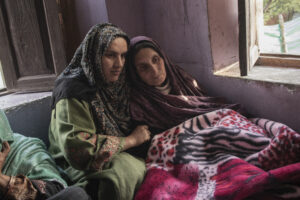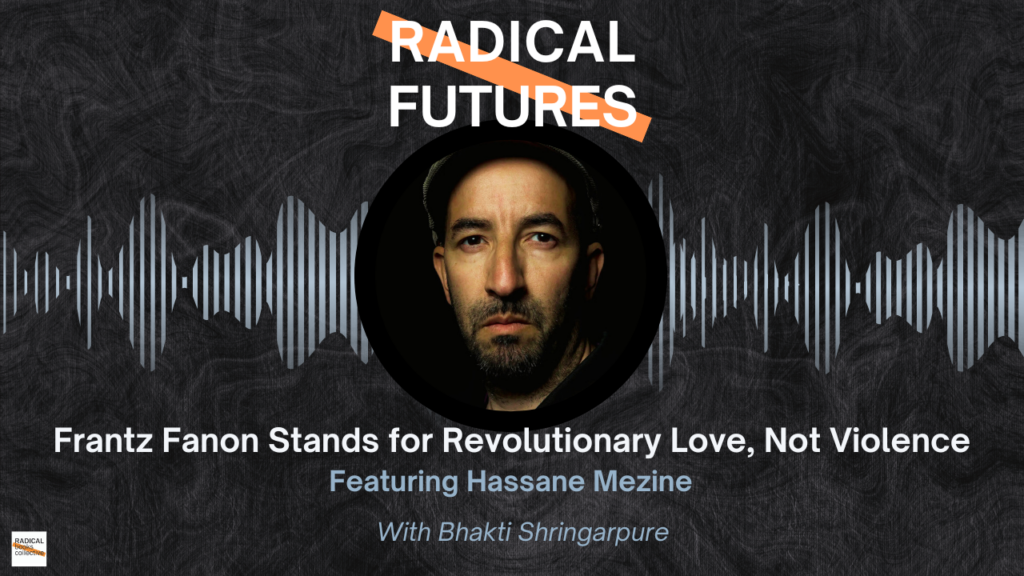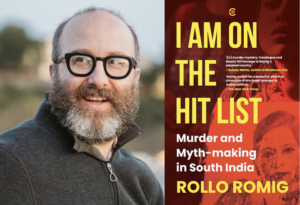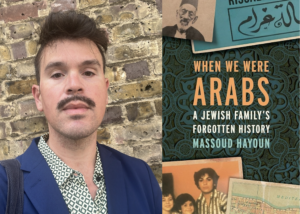
Frantz Fanon Stands for Revolutionary Love, Not Violence: Featuring Hassane Mezine

Frantz Fanon, the Martinican psychiatrist, prolific scholar, and active participant in the Algerian War of Independence against France, would have been 100 years old this year. He wrote about a wide range of intersecting topics: race, colonialism, Blackness, class, theories and methods within psychiatry at the time, internationalism, and more. Yet it is his reflections on colonial violence and the counter-violence of the colonized, published in the volume The Wretched of the Earth, that loom large even today, 64 years later.
Despite filmmaker Hassane Mezine’s and my own fairly immersive knowledge about Fanon’s life and work, our conversation inevitably turns to Fanon’s theory about violence. For Hassane, growing up in an Algerian family in France meant that the conversation about the war of liberation was all around him, yet many aspects of it were also taboo.
As a teenager, Hassane had come across Fanon’s work and instinctively knew that it carried the “keys” to the real story of the Algerian-French war as well as to colonialism, slavery, and racism; explosive topics that Hassane had become introduced to from listening to reggae music and books like Alex Haley’s Roots.
The French school curriculum did not officially assign Fanon, and to this day, Fanon remains what Hassane calls “une patate chaude” (a burning potato) because “when you get it in your hands, you don’t know what to do with it.” Fanon believed that the colonized have the right to use violent means to fight their colonizers, and that, in fact, this violence can be “cleansing” and transformative for those oppressed by colonialism.
Hassane believes that France rebuffs Fanon by insisting on a singular focus on his ideas about violent resistance, which allows them to sidestep the real issue: Fanon was an astute observer and active participant in the Algerian independence war against the French. Engaging with Fanon would mean acknowledging that “it was very violent during the colonial era. Recognizing that would mean to accept that we’re still in a colonial era.”
France’s pervasive racism, mistreatment, and violent policies towards its own Black, Arab, and Muslim communities, as well as its existing overseas territories, are glaring evidence not only of France’s past but also of the extent to which coloniality remains embedded within France’s political and institutional structures.
As Hassane went deeper into Fanon’s works and began working on a documentary project about Fanon, he had a poignant realization: “Fanon is talking about love. And the path toward love in a very violent system is to defend yourself.” Building on writer and activist Houria Bouteldjia’s ideas on revolutionary love (and who also appears in the documentary), Hassane finds that Fanon is advocating for dignity through self-defense and living together peacefully without hate or supremacy.
Hassane’s empathetic approach to Fanon is apparent in his documentary film Fanon Hier, Aujourd’hui (Fanon Yesterday, Today) and which I wrote about in detail in 2019 when it first came out. Made without much funding and using a “guerrilla” approach, the documentary is a crucial contribution to studies of Fanon and one of the rare few works that successfully brings Fanon’s ideas into the present. Fanon Hier, Aujourd’hui is divided into two sections; the first half is biographical (yesterday) and the second half focuses on theory and praxis (today).
The first section combines intimate portraits of Fanon’s life with a historical overview of French colonialism and the Algerian liberation war in which Fanon became involved. The second section features a vibrant global journey that excavates the pertinence of Fanon’s ideas in Algeria, South Africa, Niger, Palestine, Martinique, France, Portugal, and the United States. Hassane interviews writers, activists, and artists who view themselves as the “wretched of the earth,” whether due to oppressive conditions in the Global South or as mistreated migrants in the Global North. Fanon’s ideas unequivocally offer them a path towards liberatory futures.
I ask Hassane to look back at the documentary’s journey over the last five years. The film has been screened in several countries, and Hassane has been invited to speak about it in slick Western academic auditoriums, as well as in scrappier settings in Niamey and Bethlehem. The screenings and encounters in the Global South are the most memorable to him because even if people may not have read Fanon, they connect with the documentary instinctively.
He remembers the West Bank students who loved the film and wanted to listen to Hassane’s commentary but had to rush off before the checkpoints closed. Such students “understand Fanon much better than some PhD students who have studied Fanon for many years just in theory” in the US and Europe.
We come to the question of Palestine and wonder about the potency as well as the futility of Fanon’s prophetic writings, since it has now been 22 months of a live-streamed genocide. Palestine was central to Hassane’s film about Fanon, and he concluded Fanon Hier, Aujourd’hui with an interview with Samah Jabr, the only woman psychiatrist out of about a couple of dozen practicing psychiatrists in the West Bank. Jabr spoke about how Fanon’s ideas on overcoming inferiority complexes and on protesting for liberation can be therapeutic.
Hassane explains that in Palestine, “we have a typical 19th-century type of European colonialism with 21st-century technologies.” For him, this is what makes Palestine different from places like Congo or Sudan that are experiencing crises rooted in neocolonialism and strands of imperialism that impact people who are “supposed to be sovereign but are not.”
To that end, Hassane still believes that although Fanon’s ideas are crucial for grasping present-day colonialism, they must be updated. Fanon should be read alongside thinkers like Kwame Nkrumah and Walter Rodney, who have had similar theories on liberation.
As Fanon turns 100 years old, revival might be in the air, but Hassane warns against “fetishism” around the thinker. Rather, Fanon must be viewed as a “toolkit.” Hassane hopes that his film can inspire people to read more Fanon and to apply his ideas to find “psychological balance’ in their own lives. And if they can see the “future with a different perspective, then to me, this is mission accomplished.”





